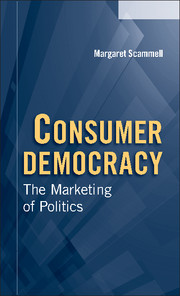Book contents
- Frontmatter
- Dedication
- Contents
- List of Tables, Figures, and Images
- Acknowledgments
- Preface: The U.S. Presidential Election of 2012
- Introduction
- 1 Political Marketing
- 2 Political Marketers
- 3 Political Brands
- 4 George W. Bush
- 5 Campaigning Effects
- 6 Citizen Consumers, Political Marketing, and Democracy
- Conclusion
- References
- Index
Conclusion
Hope Not Fear
Published online by Cambridge University Press: 05 June 2014
- Frontmatter
- Dedication
- Contents
- List of Tables, Figures, and Images
- Acknowledgments
- Preface: The U.S. Presidential Election of 2012
- Introduction
- 1 Political Marketing
- 2 Political Marketers
- 3 Political Brands
- 4 George W. Bush
- 5 Campaigning Effects
- 6 Citizen Consumers, Political Marketing, and Democracy
- Conclusion
- References
- Index
Summary
This book ends as it began, with a spirit of optimism. This is not the Panglossian cheerfulness of some marketing gurus that all is for the best in the best of all possible worlds; that good ethical business will pick up the baton dropped by politicians to deliver a greener, more sustainable, more human-rights-conscious world. It is not either simply a personal preference for hope over fear, because it is hope that makes life worth living. Nor is it afraid of the skepticism of realism, since a constant and critical weighing of the good with bad is a necessary condition for genuine optimism. However, it is upbeat about our consumer democracy. Here’s why.
Strong Citizen Commitment to Democratic Values
Public support for democratic values remain strong and, if anything, is rising, despite the huge and continuing concerns at crises of participation and democratic deficits around the globe. The anxiety indicators are well known: declining electoral turnout in many advanced industrial democracies, party memberships collapsing, and survey evidence of mounting public distrust in the formal institutions of politics. Political marketing and aggressive, sensation-seeking media are often cited as contributory factors to our modern dissatisfactions. Specifically, marketing is said to squeeze the scope of public debate, emphasize the negative, and foster naïve individualism over collective solutions (Stoker, 2006; Hay, 2007), while consumer culture generally is alleged to promote “infantile” instant gratification over the “adult” recognition of complexity in negotiation of the public good (Barber, 2007).
- Type
- Chapter
- Information
- Consumer DemocracyThe Marketing of Politics, pp. 163 - 186Publisher: Cambridge University PressPrint publication year: 2014



